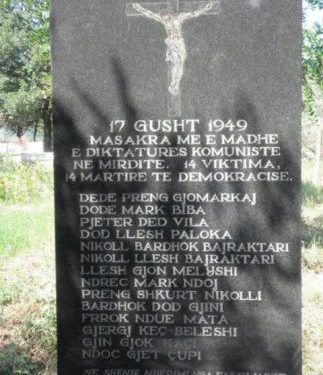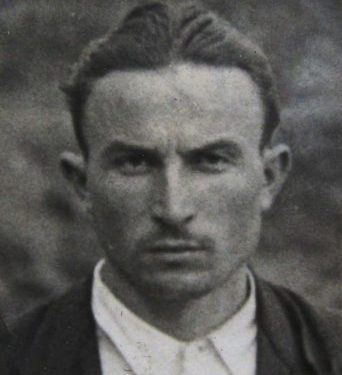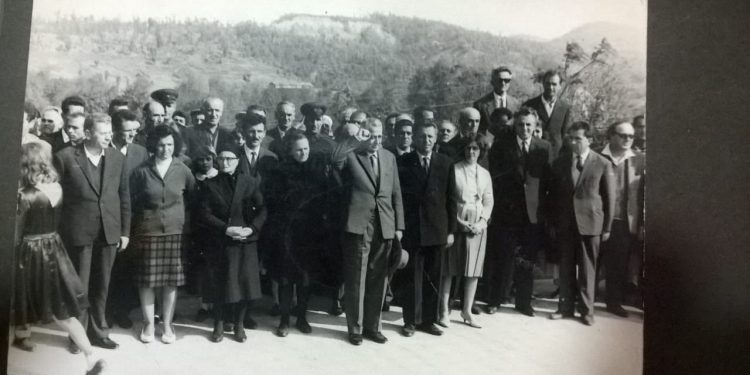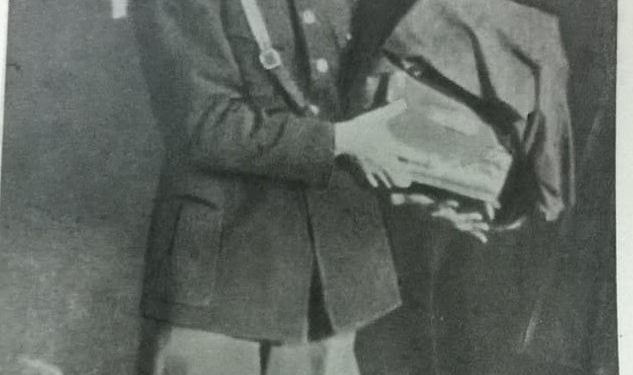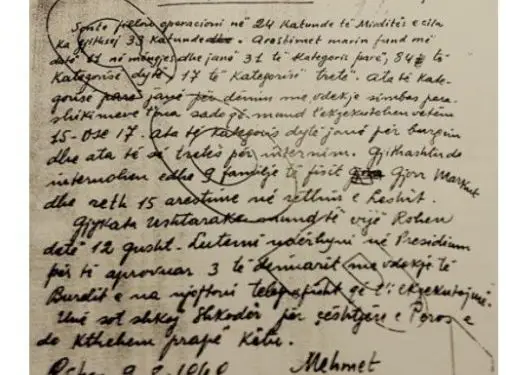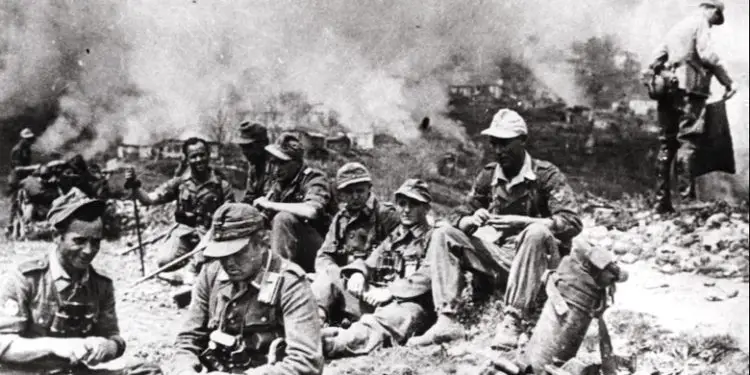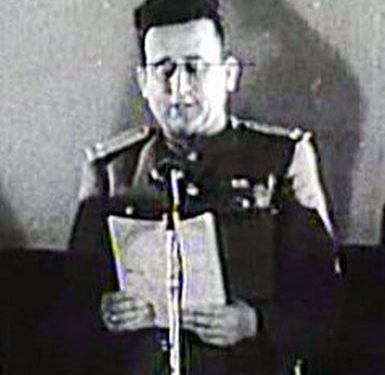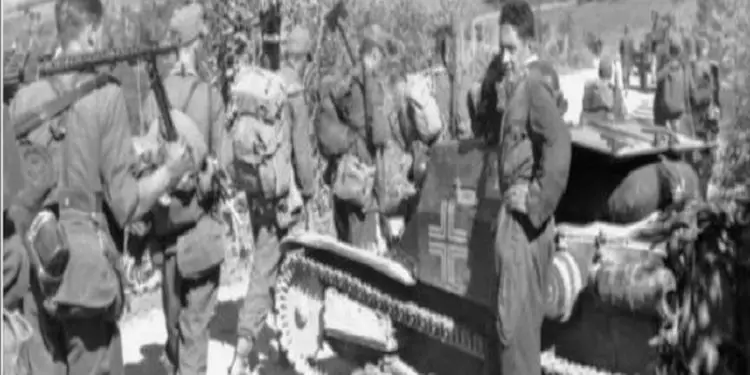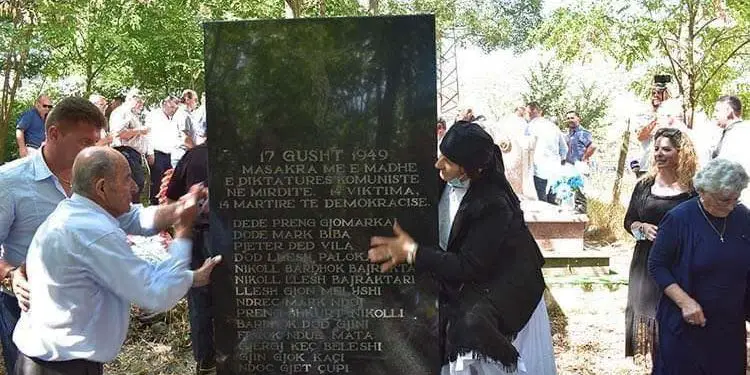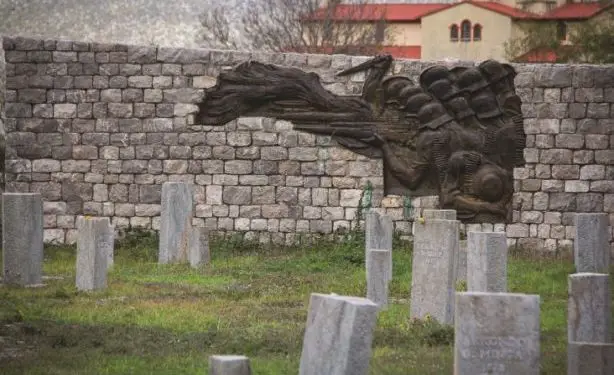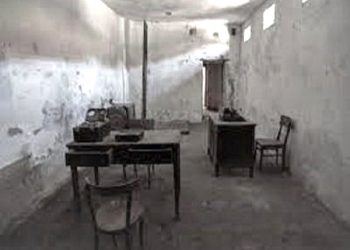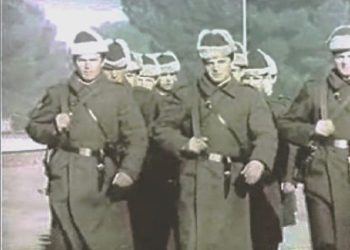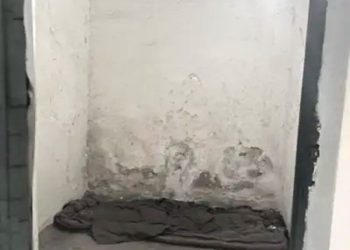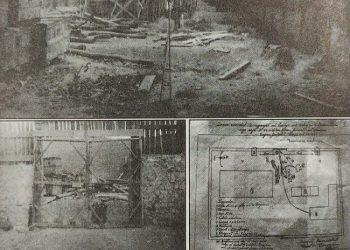Memorie.al / Some time ago, two massacres were commemorated: the 70th anniversary of ‘The Borovë Massacre,’ carried out by German Nazis, and the 65th anniversary of ‘The Mirdita Massacre,’ carried out by the communists. The commemoration was done in completely different ways. In the first case, the descendants of the Nazi criminals humbly apologized; in the second case, the descendants of the communist criminals celebrated proudly.
‘The Borovë Massacre’ occurred on July 6, 1943. A large German military convoy had set out from what was then Yugoslavia, passed through Greece, entered Albanian territory at Korçë, and from there, was heading quickly southward, aiming, perhaps, to reach Greece to confront the Anglo-American forces that were thought to be landing in the south of Greece.
Along the way, the convoy stopped in the village of Borovë, about 5 kilometers from Ersekë. The convoy leaders spoke with the village elders to find out if the road they would take next posed any danger. The village elders assured them the road was safe, and the convoy set off, greeting the elders and villagers.
A few kilometers from the village, while part of the convoy was still in Borovë, a partisan ambush at a place called Barmash fired upon it, killing and wounding several Germans, and then fleeing, leaving the village to German retaliation.
Following that action, the convoy stopped and carried out a massacre on the villagers of Borovë, killing indiscriminately over 100 people who had no connection to the partisan ambush. It is unknown if they were killed in retaliation, according to the German rule that for every German killed, ten others would be killed, or if they were enraged by the betrayal of the village residents who had told them the road was clear.
It is also unknown whether the partisans were aware or not of the discussions the Germans had with the villagers in Borovë, and the guarantee of safety they had received. If the partisans knew what had happened in the village, their responsibility for the murders committed by the Germans was and remains very great.
The Mirdita Massacre occurred on August 17, 1949. On August 7 of that year, Bardhok Biba, the most important exponent of the communist regime in Mirdita, was killed by the anti-communist group “The Committee of the Mountains.” “The Committee of the Mountains,” much like the partisan ambush at Barmash, subsequently fled, leaving the area to communist retaliation. Communist military troops, under the orders of Mehmet Shehu, savagely raided the entire Mirdita region, arresting over 300 individuals, the most influential men in the area, and interning 300 families, all of whom had no connection to Bardhok Biba’s killing.
Of the arrested individuals, 14 were sentenced to death by a rapid trial led by Bilbil Klosi: 10 by firing squad and 4 by hanging. At the place where Bardhok Biba was killed, in Qafë Valmir, the communists gathered over 2,000 Mirdita residents to witness the executions that were to be carried out: this spectacle of communist criminality and sadism. Shortly afterward, three other individuals among the arrested died from torture, bringing the number of those killed for the murder of Bardhok Biba to 17 people.
In this way, Albanian communists surpassed even German Nazis in criminality. There is another communist massacre, even more atrocious than that of Mirdita: the massacre carried out following the throwing of dynamite at the Soviet Diplomatic Representation in Tirana, which caused no casualties, but for which the communists killed 22 people who had no connection to the dynamite attack, including a woman. However, the Mirdita massacre is more similar in nature to the one in Borovë.
The difference between ‘The Borovë Massacre’, carried out by the Nazis, and ‘The Mirdita Massacre’, carried out by the communists, is that: while the first was carried out under conditions of war, in conditions where a person commits acts they would not normally commit under peace, the second massacre, the communist one in Mirdita, was carried out under conditions of peace. Another difference is that: while the former was carried out by an army against a foreign people, the second massacre was carried out by an army against its own people.
Let us come to the present day. In 2013, on the occasion of the 70th anniversary of ‘The Borovë Massacre’, the son of one of the Nazi military officers who participated in that massacre came from Germany. He had read about the massacre in his father’s memoirs and came to Albania, and, before the residents of the area where the massacre took place, he apologized in his father’s name. No one knew that man existed, and no one could hold him morally responsible to come and apologize.
Nevertheless, he came, apologized for what his father had committed, and in that way, he presented himself as a man who condemned his father’s criminal actions, as a man who was completely different from his father. A year later, on the 71st anniversary of the massacre, the German ambassador to Albania went to the same place and he, too, apologized on behalf of his people and state.
In 2014, on the occasion of the 65th anniversary of ‘The Mirdita Massacre’, Albanian communists commemorated the murder of Bardhok Biba with ceremonies, without saying a word about the murders and persecutions carried out by their predecessors against the population of the Mirdita region, as retaliation for that event. This is similar to the son of the participant in the massacre not coming to Borovë, but instead the sons of those killed by the communist partisan unit coming and commemorating their own killing.
We will pause the historical flow of the two events in question here (namely, ‘The Mirdita Massacre’ and ‘The Borovë Massacre’) and make a brief, but necessary digression before continuing with the topic we started: The more primitive a person is, the more they side with their own species, their own kind, regardless of whether their species or kind is right or wrong. A complete person, a moral person, never starts from their own interest or that of their kind to determine their positions.
In such a person, the instinct for the protection of the kind is almost extinguished, and the feeling for the protection of right and truth is highly vitalized. In this sense, when we are not ready to criticize or condemn our close relative who has committed a crime, it shows that we are still in a primitive stage of human development.
When it comes to attitudes toward strangers, toward those who are distant, the use of the criterion of truth and right is perhaps performed without much difficulty, but when it comes to personal interests, the interests of relatives, the interests of acquaintances, the interests of family members, an ordinary person finds it difficult not to side with them even when they are wrong; that is, they find it difficult to be just, to side with the truth. This attitude is instinctive and generally stems from human nature, which is in the service of the survival of the species.
An observation was made in an American primary school to highlight the children’s attitude toward their own people – an attitude that would show whether the child, who is not yet influenced by culture or environment (i.e., man in a primitive form), acts more based on feelings, based on instincts, or based on principles of justice. All the children in the school were given a questionnaire with the following questions:
- Do you think those who produce drugs should be punished?
- Do you think those who distribute drugs should be punished?
- Do you think those who use drugs should be punished?
The young students answered “yes” to all these questions. For them, all these people should be punished. The last question asked to the students was: If the drug producer, distributor, or user is: your father, brother, cousin, or friend, do you think they should be punished? Almost all the students answered “no” to this question.
Let us return to where we left off:
The actions of today’s Germans, although the Albanian press welcomed them, are still completely incomprehensible to our mentality, culture, and feelings. You must be a person with a culture of supreme appreciation for the truth, with moral courage, and with strong religious feelings to act in that way – things that are still lacking among us.
The behavior of the German, the Nazi’s son, was interpreted in the Albanian media more as a testimony of the Germans’ guilt, as a case of the partisans’ innocence, as an opportunity to highlight the martyrdom of the villagers, rather than as an act of the highest degree of moral character of today’s Germans, as evidence of the denazification of modern Germany.
This action, among other things, should also have served to make the descendants of the communist criminals who persecuted, tortured, and killed thousands of Albanians during their rule think carefully and encourage them to act like the German man and the Germans.
Here I do not refer to the descendants of Enver Hoxha’s family, who are still convinced to this day that the criminal system their ancestor created and implemented was the best and most humane in the world, or to those who were and remained communist and cruel. Instead, I refer to people such as: Gramoz Pashko, Ardian Klosi, Bashkim Shehu, and many, many others like them, who presented and present themselves as democrats, as harsh critics of the communist system, as critics of that cruel and bloody system, as critics of the system that their parents built and maintained with blood, who persecuted, condemned, tortured, and killed entirely innocent people.
Do you know on what condition Father Anton Harapi accepted the responsibility of being a member of the Regency during the German occupation? Among other things, he (Father Anton) stipulated that: they should not expect any signature from him for death sentences.
You will say again: what does it matter, whether the descendants of the criminals apologize or not, those who were led to death will not be resurrected. This is also true: they will not be resurrected, but the descendants of the criminals would show in that instance that they were not like their parents, that they are now different from them, that they have carried out DE communization within themselves, and that they are truly sorry for those whom communism massacred.
Do you know what Gandhi said about prayer? “Prayer that is made does not change God’s plans for him, but it changes the one who prays.” Similarly, the request for an apology from the descendants of criminals will not undo what the criminal ancestors did, but it will change those who pray for forgiveness – the person of today, the child of the criminal parent. Memorie.al




